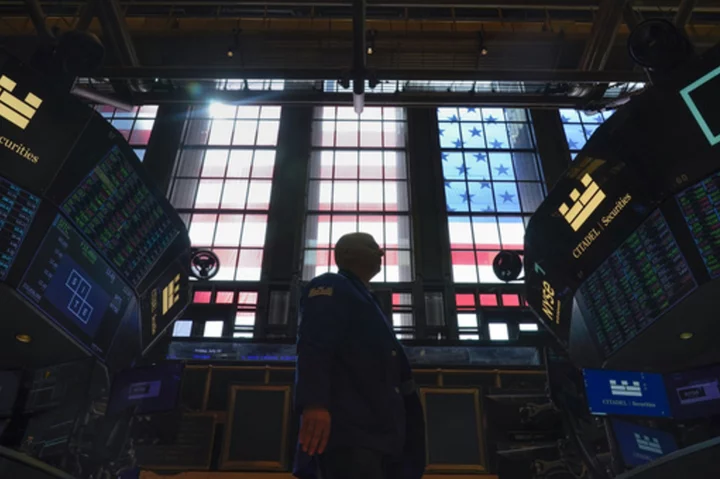NEW YORK (AP) — Stocks are ticking higher on Wall Street early Monday ahead of a big week for central banks and interest rates around the world.
The S&P 500 was 0.3% higher in early trading, coming off its fourth straight winning week. The Dow Jones Industrial Average was up 116 points, or 0.3%, at 33,992, as of 9:40 a.m. Eastern time, while the Nasdaq composite was 0.5% higher.
Cruise operator Carnival rode a 9.2% upswell as analysts upgraded its stock on signs demand remains steady for the industry and that pricing is holding up. Nasdaq, the exchange company that’s pushing more into technology, fell 10% after saying it would buy Adenza, a risk management and regulatory software provider, for $10.5 billion in cash and stock.
The U.S. stock market has climbed to its highest level since August on hopes the economy may avoid a recession and the Federal Reserve may soon take it easier on its hikes to interest rates. Traders are betting the Fed will hold rates steady at its next meeting, which concludes on Wednesday. That would be the first time it hasn’t hiked rates at a meeting in more than a year.
A halt or a pause to hikes would give the economy and financial markets some breathing room. The Fed has already pulled rates to their highest level since 2007 in hopes of driving down inflation, and the increases have helped cause high-profile U.S. bank failures and a monthslong contraction in the manufacturing industry.
This week will also see the latest updates on inflation across the economy. On Tuesday, economists expect a report to show prices for consumers were 4.1% higher in May than a year earlier. That’s way above the Fed’s target of 2% inflation, but it would be down from 4.9% inflation in April and a peak of more than 9% last June.
Because prices were already much higher a year ago thanks to the worst inflation in 40 years, further increases in upcoming months may not appear quite so dramatic. Inflation could fall to 3.2% in June, and the next two months could see one of the biggest drops in inflation over ,a two-month period over the last 70 yearsaccording to Jonathan Golub, chief U.S. equity strategist at Credit Suisse.
But much of that easing would simply be because of how high prices had already climbed, and Wall Street traders are still bracing for the Fed to resume hiking rates in July. The question is how much further it will go beyond that.
The Fed is in a tight spot because any increases to rates would mean more pressure on the U.S. banking system. It’s still absorbing all the past rate increases, which have caused some customers to yank their bank deposits as they herd into higher-yielding money-market funds. Higher rates have also forced down the values of bonds and other investments banks made when interest rates were low.
“While incoming data point to resilience in activity and stickiness in inflation, the Fed appears to want additional time to monitor policy lags and regional bank stress,” Michael Gapen and other economists wrote in a BofA Global Research report.
They see a June pause by the Fed as a close call. Recent surprise hikes by central banks in Canada and Australia show a hike could still happen, but Gapen said the Fed doesn’t usually hike rates when the widespread assumption on Wall Street is for a hold. That may change if Tuesday’s inflation report comes in hotter than expected.
Besides the Federal Reserve, central banks in Europe and Japan will also be meeting this week on interest rates.
In the bond market, the yield on the 10-year Treasury rose to 3.75% from 3.74% late Friday. It helps set rates for mortgages and other important loans.
The two-year Treasury yield, which moves more on expectations for the Fed, slipped to 4.59% from 4.60%.
In stock markets abroad, European indexes were modestly higher after Switzerland’s UBS said it has completed its takeover of embattled rival Credit Suisse in a government-arranged rescue combining the country’s two largest banks to safeguard the country’s reputation as a global financial center and choke off market turmoil.
In Asia, stock indexes were mixed.
—-
AP Business Writers Matt Ott and Elaine Kurtenbach contributed.

